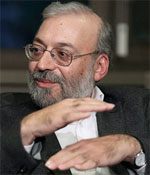Source: medium.com
By Foaad Haghighi

In a recent interview, Javad Larijani, Secretary of the High Council for Human Rights of the Judiciary of the Islamic Republic of Iran, said: “It turns out Iran’s sanctions were not for nuclear weapons; any sanctions imposed are based on a new pretext.” Is it really true that no matter what the Islamic Republic of Iran does to please the world it cannot succeed? Or is it that the Iranian regime, including the elected President and Representatives, as well as selected others, such as the Head of the Judiciary, the Supreme Leader and others, are not doing what they are required to do according to different criteria and agreements they have signed?
In this interview with Tasnim News Agency, yet another spokesman for the regime, Larijani, adds: “The representative model is one of the models of democracy on which the Islamic Republic is based.” It is clear that Mr. Larijani is talking about the electoral system, but he has forgotten the part where the electorate are not allowed to criticize the actions taken by selected groups, such as the Supreme Leader, the Judiciary, or the Revolutionary Guards.
On Monday, July 3, Seyyed Ali Khamenei, the Iranian leader, said: “the Judiciary” should be the champion of human rights in the community, and in whatever field it is necessary, should defend the rights of people with power, and confront offenders and lawbreakers. “In the past few days, judicial officials and Revolutionary Guards criticized the government’s performance, and today Ali Khamenei indirectly showed his solidarity with the Judiciary and the Revolutionary Guards, responding to Hassan Rouhani’s criticisms of his talks a day earlier on July 2.
Javad Larijani in his Interview with Tasnim added: “In fact, the Islamic Republic has been exposed to various attacks. Today, one side of the assault is an economic offensive; it turns out that the sanctions do not have anything to do with nuclear weapons. With the approval of the Senate, any sanctions taken against us will come out under a different pretext. Another field is the attack on security and the sending of terrorists. Another offensive is cultural and intellectual aggression. Human rights are on the attack, so we should not think that the issue of human rights is a separate field.”
In the same interview, he claims that the High Council for Human Rights of the Judiciary of the Islamic Republic of Iran has answered any complaint in the area of human rights. He said:”At the United Nations, there is a complaint mechanism, and no grievances have been filed against us, since we have responded to any reports which existed.”
To refresh Mr. Larijani’s memory, I would like to add just three points out of twenty-five points from the report of the 71st session of the UN Human Rights Council dated 01/02/2017 under “Situation of human rights in the Islamic Republic of Iran”:
- Strongly urges the Islamic Republic of Iran to eliminate, in law and in practice, all forms of discrimination and other human rights violations against women and girls, including with respect to the right to freedom of movement, the right to enjoyment of the highest attainable standard of physical and mental health and the right to work, to take measures to ensure protection for women and girls against violence and their equal protection and access to justice, to address the worrisome incidence of child, early and forced marriage, as recommended by the Committee on the Rights of the Child, to promote, support and enable women’s participation in leadership and decision-making processes and, while recognizing the high enrolment of women in all levels of education in the Islamic Republic of Iran, to lift restrictions on women’s equal access to all aspects of education and women’s equal participation in the labour market and in all aspects of economic, cultural, social and political life;
- Calls upon the Islamic Republic of Iran to eliminate, in law and in practice, all forms of discrimination and other human rights violations against persons belonging to religious, ethnic, linguistic or other minorities, including but not limited to Arabs, Azeris, Balochis and Kurds, and their defenders;
- Expresses serious concern about ongoing severe limitations and restrictions on the right to freedom of thought, conscience, religion or belief, restrictions on the establishment of places of worship, attacks against places of worship and burial and other human rights violations, including but not limited to harassment, persecution, arbitrary arrests and detention, denial of access to education and incitement to hatred that leads to violence against persons belonging to recognized and unrecognized religious minorities, including Christians, Jews, Sufi Muslims, Sunni Muslims, Yarsanis, Zoroastrians and members of the Baha’i faith and their defenders in the Islamic Republic of Iran, and calls upon the Government of the Islamic Republic of Iran to release all religious practitioners imprisoned for their membership in or activities on behalf of a recognized or unrecognized minority religious group, including the seven Baha’i leaders declared by the Working Group on Arbitrary Detention of the Human Rights Council to have been arbitrarily detained since 2008, and to eliminate, in law and in practice, all forms of discrimination, including economic restrictions, such as the closure or confiscation of businesses and properties, the cancellation of licences and denial of employment in certain public and private sectors, including government or military positions and elected office, and other human rights violations against persons belonging to recognized and unrecognized religious minorities;
So, I would like to ask Mr. Larijani to read these reports more carefully when he tries to answer the United Nations, or fix issues that the regime of the Islamic Republic of Iran has forgotten for the last 37 years.
Leave a Reply